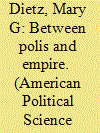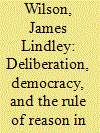| Srl | Item |
| 1 |
ID:
113553


|
|
|
|
|
| Publication |
2012.
|
| Summary/Abstract |
Aristotle lived during a period of unprecedented imperial expansionism initiated by the kings of Macedon, but most contemporary political theorists confine his political theorizing to the classical Greek city-state. For many, Aristotle's thought exhibits a parochial Hellenocentric "binary logic" that privileges Greeks over non-Greeks and betrays a xenophobic suspicion of aliens and foreigners. In response to these standard "polis-centric" views, I conjure a different perceptual field-"between polis and empire"-within which to interpret Aristotle's Politics. Both theorist and text appear deeply attentive to making present immediate things "coming to be and passing away" in the Hellenic world. Moreover, "between polis and empire," we can see the Politics actually disturbing various hegemonic Greek binary oppositions (Greek/barbarian; citizen/alien; center/periphery), not reinforcing them. Understanding the Politics within the context of the transience of the polis invites a new way of reading Aristotle while at the same time providing new possibilities for theorizing problems of postnational citizenship, transnational politics, and empire.
|
|
|
|
|
|
|
|
|
|
|
|
|
|
|
|
| 2 |
ID:
110529


|
|
|
|
|
| Publication |
2011.
|
| Summary/Abstract |
Deliberative democratic theorists argue that important moral questions turn on whether regimes are sufficiently deliberative. To attribute "deliberativeness" to a regime, we need an account of "deliberative integration" that connects such a holistic assessment to the acts or qualities of individuals and smaller groups. I turn to Aristotle's Politics for instruction in developing such accounts, arguing that he judges regimes according to how reliably they act pursuant to excellent common deliberation-a manner of excellent rule that I call the "rule of reason." I then interpret Aristotle's metaphorical argument for the "wisdom of the multitude" to establish the claim that democracies may best integrate citizens' deliberations. This interpretation illuminates Aristotle's complex evaluation of regimes, including his ambivalent views on the rule of the many. It also suggests a structure for contemporary accounts of deliberative integration helpful even for those who differ from Aristotle in their basic moral concerns.
|
|
|
|
|
|
|
|
|
|
|
|
|
|
|
|
| 3 |
ID:
110642


|
|
|
|
|
| Publication |
2011.
|
| Summary/Abstract |
This article addresses the pedagogical value of teaching Aristotle's Politics 4.1 early in an introductory course in political theory that draws texts from the history of political thought. I argue that this chapter provides an interpretive key to understanding arguments made elsewhere in the Politics and can be used to introduce students to the kinds of theorizing that appear in the study of politics more generally. I begin by laying out some common learning obstacles that students experience in introductory political theory courses, using Politics 4.1 to address these issues. I then outline my approach to this text and conclude by reflecting on some of the possibilities and limitations of this method of introducing the nature of political theory to an undergraduate population.
|
|
|
|
|
|
|
|
|
|
|
|
|
|
|
|